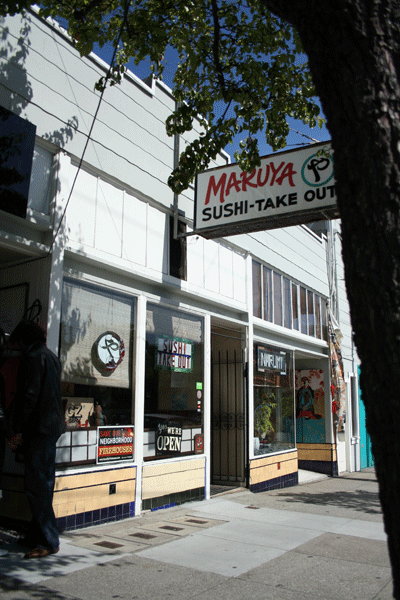Story and photographs by Carina Woudenberg
Yoshimi Oune, owner of Maruya Sushi at 1904 Fillmore, never had any ambition to own the tiny take-out shop her mother opened in 1965. She says she just gradually took over as her mother got older and became less able to handle it on her own.
Today, with the help of her husband, Kats Oune, she’s still at it, preparing the same sushi rolls her mother used to make — “the basics,” she says — and greeting customers that include two or three generations of the store’s faithful fans.
The small space makes it impossible to dine in at Maruya, but that hasn’t prevented the shop from gaining a loyal following. In addition to the basics — a variety of fish and vegetable rolls, miso soup, edamame and seaweed salad — Maruya offers unusual rolls not typically found in other sushi restaurants.
Saba sushi, the shop’s signature roll, is one of the most unusual and distinctive tastes on the street.
First the mackerel is salted and set aside for three to four days before the salt is rinsed off. Then the fish is marinated in sweet vinegar for another three to four days before it is placed in a wooden box with a layer of rice and seaweed and pressed into perfectly square pieces.
Kats Oune says the taste is similar to pickled herring. To tame the strong pickled taste, Yoshimi places lemon slices on each piece — an addition to her mother’s traditional recipe.
Yoshimi’s mother, Chiyoko Matsuno, was born in the United States but moved with her family to Wakayama, Japan, when she was still a baby. When she came back to the United States as an adult, her English wasn’t very good.
“That’s the reason she opened the shop,” Yoshimi says. “She couldn’t work anywhere else.”
Eventually she was running two sushi shops and convinced her daughter to take over one for her. As her mother aged, Yoshimi took on more and more of the work until she took over the Fillmore shop entirely about 20 years ago. When Yoshimi’s father passed away, they closed the other store.
Yoshimi’s mother continued to spend a lot of time in the Fillmore shop. “She came and sat here all day — just to keep her eye on me, I guess,” Yoshimi says.
Yoshimi sometimes didn’t feel like making saba sushi, so she would say they were sold out. Her mother soon caught on and coaxed her daughter into making the roll — and now it has become the shop’s signature.
Now her husband Kats helps her out in the shop. They say they have witnessed many changes on Fillmore Street over the years.
“It used to be quiet. Now there are all these boutique shops,” Yoshimi says. “It all got fancy.”
The Ounes are both in their early 70s, but say they hadn’t thought about retiring until they read a complaint on Yelp that the shop’s service was slow due to the owners’ ages.
“A friend of ours brought the review in and read it and we kept laughing,” Kats says.
“So we kept reading it and laughed and laughed and laughed,” Yoshimi added.
Filed under: Food, Drink & Lodging






